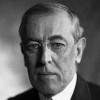I can imagine no greater disservice to the country than to establish a system of censorship that would deny to the people of a free republic like our own their indisputable right to criticize their own public officials. While exercising the great powers of the office I hold, I would regret in a crisis like the one through which we are now passing to lose the benefit of patriotic and intelligent criticism.
Quotations about:
public official
Note not all quotations have been tagged, so Search may find additional quotes on this topic.
When a man assumes a public trust, he should consider himself as public property, and justly liable to the inspection and vigilance of public opinion; and the more sensibly he is made to feel his dependence, the less danger will there be of his abuse of power.
Thomas Jefferson (1743-1826) American political philosopher, polymath, statesman, US President (1801-09)
Conversation with Baron Humboldt (1807)
(Source)
In Seymour, A Winter in Washingtonm ch. 9 (1824), further identified in Raynor, Life of Jefferson (1832). As it is all anecdotal, the accuracy may be easily questioned, but its proximity to the events lends it a certain validity.
What I call a great minister is one who employs the Way in serving his sovereign. If he cannot do that, he resigns.
[所謂大臣者、以道事君、不可則止。]
Confucius (c. 551- c. 479 BC) Chinese philosopher, sage, politician [孔夫子 (Kǒng Fūzǐ, K'ung Fu-tzu, K'ung Fu Tse), 孔子 (Kǒngzǐ, Chungni), 孔丘 (Kǒng Qiū, K'ung Ch'iu)]
The Analects [論語, 论语, Lúnyǔ], Book 11, verse 24, sec. 3 (11.24.3) (6th C. BC – AD 3rd C.) [tr. Hinton (1998)]
(Source)
Numbered 11.23 by Legge and other early translators, as noted. More recent translators use 11.24, though some use 11.22. All are noted below.
(Source (Chinese)). Alternate translations:
What is called a great minister is one who serves his prince according to what is right; and when he finds he cannot do so, retires.
[tr. Legge (1861), 11.23]
Those whom we call 'great ministers' are such as serve their prince conscientiously, and who, when they cannot do so, retire.
[tr. Jennings (1895), 11.23]
Men I call statesmen are those who will serve their master according to their sense of duty; who, however, when they find they cannot do that, consistently, with their sense of duty, will resign.
[tr. Ku Hung-Ming (1898)]
He who may be called a great minister is one who serves his Prince according to the right, and when that cannot be, resigns.
[tr. Soothill (1910) 11.23]
You call a man a great minister when be serves his prince honestly. and retires when he cannot.
[tr. Pound (1933), 11.23]
What I call a great minister is one who will only serve is prince while he can do so without infringement of the Way, and as soon as this is impossible, resigns.
[tr. Waley (1938), 11.23]
The so-called great minister serves his prince in keeping with The Right Way, and if that is impossible, he quits his post.
[tr. Ware (1950), 11.22]
The term "great minister" refers to those who serve their lord according to the Way and who, when this is no longer possible, relinquish office.
[tr. Lau (1979), 11.24]
What I call a great minister serves his ruler in accordance with the Way, and when it is impossible to do so he resigns.
[tr. Dawson (1993), 11.22]
A great minister is a minister who serves his lord by following the Way, and who resigns as soon as the two are no longer reconcilable.
[tr. Leys (1997), 11.24]
Those who are called great ministers use the Way to serve the sovereign. If thye cannot, they should then stop.
[tr. Huang (1997), 11.22]
The persons named as the Great Officials, should service the Lords with the benevolent way, and stop if the way does not work.
[tr. Cai/Yu (1998), #284, 11.24]
What are called great ministers are those who serve their lord with the way [dao], and when they cannot, resign.
[tr. Ames/Rosemont (1998), 11.24]
Those whom one calls great ministers serve their ruler according to the Way, and when they can no longer, they stop.
[tr. Brooks/Brooks (1998), 11:22]
What we call "great ministers" are those who seek to serve their lord by means of the Way, and who resign if unable to do so.
[tr. Slingerland (2003), 11.24]
The term “great minister” applies to someone who serves the ruler according to the Way. If he cannot do that, he retires.
[tr. Watson (2007), 11.24]
The term "great ministers" applies to those who serve their lord in a moral way. If they simply cannot, then they stop.
[tr. Chin (2014), 11.24]



